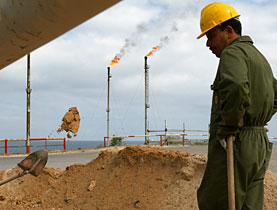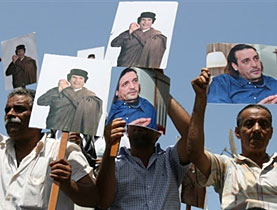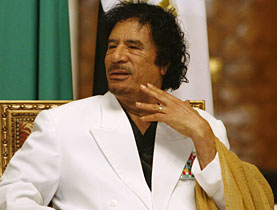Swiss citizen arrests deepen Libyan crisis

Switzerland's foreign ministry has voiced concern at the detainment of two Swiss nationals in "alarming conditions" in Libya.
The pair were held as Libya rolled out a retaliatory response to the arrest of Moammar Gaddafi’s son Hannibal in Geneva on July 15, including the alleged suspension of oil supplies to Switzerland on Thursday.
The Swiss nationals, one of whom is an employee of Swedish-Swiss firm ABB, have been formally arrested and charged with immigration offences, ministry spokesman Jean-Philippe Jeannerat said on Thursday.
They had been held in “unacceptable and very alarming” conditions since being detained on Saturday and the Swiss government had serious doubts about the Libyan allegations against the pair, Jeannerat added.
They are currently being kept in a small cell along with 20 other detainees.
“The top priority for us is to find ways to improve their situation in jail and secure their release at soon as possible.”
Jeannerat told swissinfo that the government was in close contact with other Swiss expatriates in Libya, of which there are currently about 40.
“We are on the way to a full blown crisis,” he said.
“Sabre-rattling”
Hannibal, whose real name is Motassim Bilal, and his wife Aline were charged by a Swiss magistrate with inflicting physical injuries and using threats and force against two of their staff. They were released on bail and have left the country.
Libya has since recalled some of its diplomats from Switzerland, reduced the number of flights to the country and stopped issuing visas to Swiss citizens.
On Thursday Ali Bilhajj Ahmed, the head of the country’s state-run General National Maritime Transportation Company, said all the country’s oil shipments to Switzerland had been stopped as of Wednesday.
“Tankers will stop carrying oil that has Switzerland as the final destination,” Ahmed said.
But by Thursday afternoon the managing director of the Swiss Oil Association said he had received no confirmation Libya had turned off the taps.
“I’m sceptical about the truthfulness of this statement because it comes from the shipping organisation and not from the national oil organisation,” Rolf Hartl told swissinfo. “Therefore, the chances that this marks a new chapter in this sabre-rattling exercise by the Libyans is about 50 per cent.”
“Such a decision about an embargo would be taken by the highest level in the national oil company and not by the shipping company,” he added.
For its part, the Swiss government has not received official notice of an embargo on oil supplies from Libya.
All ships carrying Swiss-made goods have also been prohibited from unloading their cargo at Libyan ports, Libyan authorities said in a statement shortly following a staged protest outside the Swiss embassy in Tripoli.
The Libyans refused to provide a figure on the amount of oil at stake, but Ahmed said that it was the “least they could do” after Hannibal’s arrest.
The Swiss foreign ministry said it had taken note of demands for an official apology for the arrest, issued in a statement by the shipping firm.
The government has asked the North African country to work “to prevent a crisis between the two countries” and has sent a delegation to Tripoli.
No major disruption
Switzerland imports 60,000 barrels a day of oil from Opec member Libya – around 50 per cent of the Swiss crude oil supply.
“Libyan imports reflect about 20 per cent of Switzerland’s oil consumption,” Hartl said. “About 60 per cent enters Switzerland as finished products and only 40 per cent comes as crude into the two Swiss refineries – one of which is owned by the Libyans.”
“We will have plenty of time to adjust our supply scheme. Libyan imports will be compensated first of all by imports from refineries in Western Europe. There are plenty of products around Europe so I don’t see any major disturbances for the Swiss oil markets.”
Eric Scheidegger, a senior official at the State Secretariat of Economic Affairs, added: “The Swiss crude oil market is very diversified.
“From the point of view of today we can assume with good reason that the Swiss crude oil and refinery market can get the necessary supplies from elsewhere if Libya were to impose its boycott.”
swissinfo
Libya has a population of just under six million.
Libya is Switzerland’s second-largest trading partner in Africa (after South Africa).
It provides around 50% of Swiss crude oil imports.
In 2007 imports from Libya, consisting almost exclusively of petroleum, dropped by 1.1% to SFr1.66 billion.
In 2007 exports, mainly in the machinery and pharmaceutical industries, rose by 16.3% to SFr278.6 million.
Libya held around SFr6.5 billion in 2007 in Swiss bank accounts in 2007, according to Swiss National Bank statistics.

In compliance with the JTI standards
More: SWI swissinfo.ch certified by the Journalism Trust Initiative


You can find an overview of ongoing debates with our journalists here. Please join us!
If you want to start a conversation about a topic raised in this article or want to report factual errors, email us at english@swissinfo.ch.